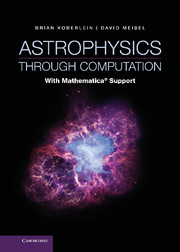6 - Binaries and clusters
Published online by Cambridge University Press: 05 June 2014
Summary
Although the two-body problem in Newtonian dynamics is easily solved, the motion of three or more gravitating objects has no analytical solution. To explore the behavior of clusters (the N-body problem) we must approach them computationally. In this chapter we focus on the Hamiltonian approach, as Mathematica is especially suited for obtaining practical solutions of Hamiltonian equations. We will start with a simple Newtonian problem and show how it is transformed into Hamiltonian form. We will then move to a description of the many ways Mathematica and its available tools support the study of differential equations in general and Hamiltonian equations in particular. A good foundation to the Hamiltonian approach can be found in Abraham and Marsden (1980), which covers analytical dynamics, Hamiltonian dynamics, and its application to celestial mechanics.
As we will see, the N-body problem often leads to chaotic motion, specifically deterministic chaos. Deterministic chaos has its roots in the celestial mechanics of the solar system, which is one example we will explore. The first text to hint at chaos (as we now understand it) was in Poincaré's book Les méthodes nouvelles de la Méchanique celeste. We will here follow its English translation (Poincaré, 1993). A modern perspective of the subject can be found in Diacu and Holmes (1996) and Peterson (1993), although references on the subject are vast and a comprehensive list is not covered here.
- Type
- Chapter
- Information
- Astrophysics through ComputationWith Mathematica® Support, pp. 186 - 219Publisher: Cambridge University PressPrint publication year: 2013

